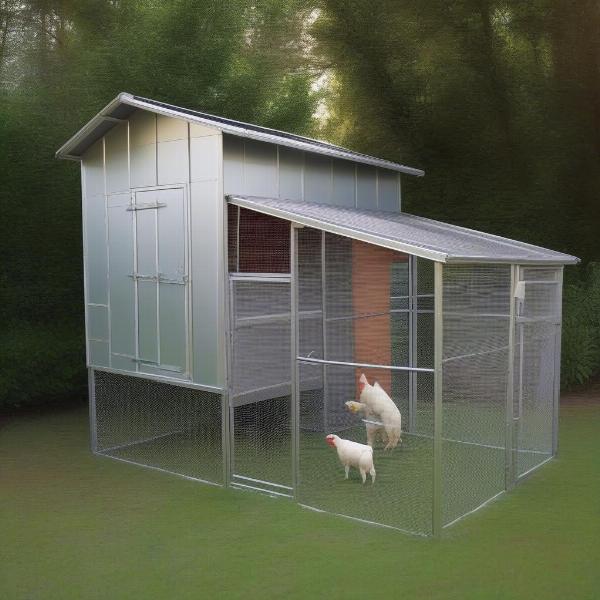Protecting your flock from predators is a crucial aspect of chicken keeping. While fences and other physical deterrents are important, some dog breeds possess natural instincts and temperaments that make them exceptional guardians. This guide explores the world of dogs that protect chickens, examining their inherent qualities, training requirements, and how to successfully integrate them into your farm or backyard setup. We’ll cover everything from breed selection to training techniques, ensuring you’re equipped to choose the right canine companion for your feathered friends.
Best Breeds for Protecting Chickens
Not every dog is cut out for the job of chicken guardian. Certain breeds are naturally predisposed to protect livestock, exhibiting traits like alertness, territoriality, and a gentle nature with smaller animals. Here are some of the most popular and effective breeds for protecting chickens:
- Great Pyrenees: Known for their imposing size and gentle nature with livestock, Great Pyrenees are classic chicken guardians. Their thick white coats protect them from the elements, allowing them to stay outside with the flock. They are inherently protective and will deter predators with their bark and presence.
- Akbash Dog: Another large, white-coated breed, the Akbash Dog is known for its independence and loyalty. They are highly intelligent and form strong bonds with their charges, making them devoted protectors of poultry.
- Maremma Sheepdog: Similar in appearance to the Great Pyrenees, Maremma Sheepdogs are also effective guardians. They are alert and courageous, quickly warning off potential threats.
- Anatolian Shepherd Dog: A powerful and independent breed, Anatolian Shepherds are known for their territorial instincts. They are naturally suspicious of strangers and will fiercely defend their territory, including your chickens.
Training Your Dog to Protect Chickens
Even with a naturally protective breed, proper training is essential for success. Here are some key steps to training your dog to protect chickens:
- Early Socialization: Introduce your puppy to the chickens from a young age, under close supervision. This allows them to become accustomed to the chickens’ presence and understand they are part of the protected flock.
- Positive Reinforcement: Reward desired behaviors, such as gentle interaction with the chickens and alertness to potential threats. Use treats, praise, and positive reinforcement to encourage appropriate guarding behavior.
- Consistency: Maintain a consistent training schedule and reinforce the desired behaviors regularly. Consistency is key to establishing clear boundaries and expectations for your dog.
- Supervised Interaction: Always supervise interactions between your dog and the chickens, especially in the beginning. This helps prevent any accidental harm and ensures a positive relationship develops between them.
- Address Undesirable Behaviors: If your dog exhibits any aggressive or predatory behaviors towards the chickens, address them immediately with firm correction and redirection.
Creating a Safe Environment
 Secure chicken coop with attached dog run
Secure chicken coop with attached dog run
Beyond training, creating a safe and secure environment for both your chickens and your dog is crucial. This includes:
- Secure Fencing: Invest in sturdy fencing to keep predators out and your chickens contained. A dog run attached to the coop can provide your dog with a designated space to patrol and monitor the flock. galvanised dog run panels uk are a great option.
- Proper Shelter: Provide your dog with adequate shelter from the elements, especially if they will be spending a significant amount of time outdoors with the chickens.
- Fresh Water and Food: Ensure your dog has access to fresh water and a balanced diet. A well-nourished dog is a happy and effective guardian.
Conclusion
Choosing the right dog and providing proper training can significantly enhance the safety and security of your flock. By understanding the breeds best suited for the task and implementing effective training techniques, you can create a harmonious environment where your chickens and canine companion thrive together. Remember that consistency, patience, and positive reinforcement are key to building a strong bond and achieving success in protecting your feathered friends. Consider these factors and choose wisely – your chickens will thank you for it.
FAQ
- What if my dog kills a chicken? This is a serious issue and requires immediate intervention. if a dog kills a chicken will it kill again offers further advice on this topic.
- Can any dog breed protect chickens? While some breeds are naturally inclined to protect livestock, not all dogs are suitable for this role.
- How much training is required? The amount of training varies depending on the individual dog and breed, but ongoing reinforcement is essential.
- What if my dog eats a cooked chicken? This could be dangerous. my dog ate a whole rotisserie chicken can give you further information.
- What are the best breeds for guarding chickens? Breeds like the Great Pyrenees, Akbash Dog, Maremma Sheepdog, and Anatolian Shepherd are often recommended. For a deeper dive into breeds, check out our article on best dogs with chickens.
- How do I stop my dog from attacking my chickens? how to stop a dog from killing chickens provides practical strategies and tips.
- What kind of fencing should I use? Sturdy, high fencing is essential to keep predators out and your chickens safe.
ILM Dog is your go-to resource for expert advice on all things dog-related. From breed selection to training and health, we offer a wealth of information to help you provide the best possible care for your canine companion. We specialize in breed information, health and wellness, training and behavior, and product recommendations. Contact us at [email protected] or +44 20-3965-8624 for personalized guidance. Visit ILM Dog today for more valuable resources and tips.